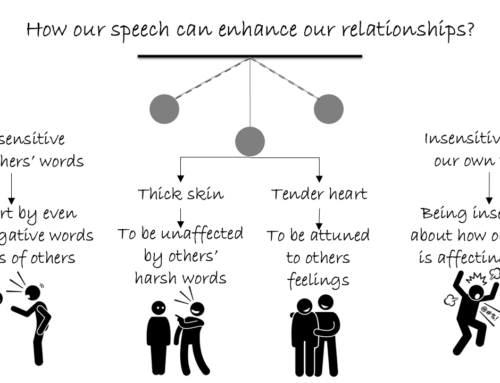The Bhagavad-gita (17.15) explains that speaking the truth in a way that is beneficial, pleasing and non-agitating is the discipline of speech. Neglecting this verbal discipline can have grave consequences, as most of us will have witnessed or even experienced. Harsh words can break hearts and wreck relationships. Even when the effects are not so devastating, still careless words can intensely scar the hearts of those to whom they are directed. These scars are often severe and sometimes incurable – especially if the inconsiderate words come from loved ones.
It is not that we don’t know about these dire consequences of inconsiderate words. Being aware, we often resolve to avoid uttering such words. Yet, when we feel provoked, we frequently find ourselves, to our dismay, lashing out with the very kind of words that we had resolved to avoid.
How can we check ourselves during the heat of the moment? The same Gita verse also mentions regular recitation of scriptures as the last discipline of speech. This verbal discipline reveals the secret that can empower us to follow the preceding disciplines. When we regularly recite scriptures and also the holy names that are the consistent and conclusive gist of scriptures, we become connected with the almighty power of Krishna. This power enables us to take charge of ourselves when our lower self incites us to speak insensitively.
We can use whatever willpower we presently have to cultivate this critical discipline of recitation of divine sounds – both on a regular basis and especially when we feel provoked. This discipline will empower us to speak sensitively so as to address problems without attacking people.
Bhagavad Gita Chapter 17 Text 15
“Austerity of speech consists in speaking words that are truthful, pleasing, beneficial, and not agitating to others, and also in regularly reciting Vedic literature.”



Leave A Comment